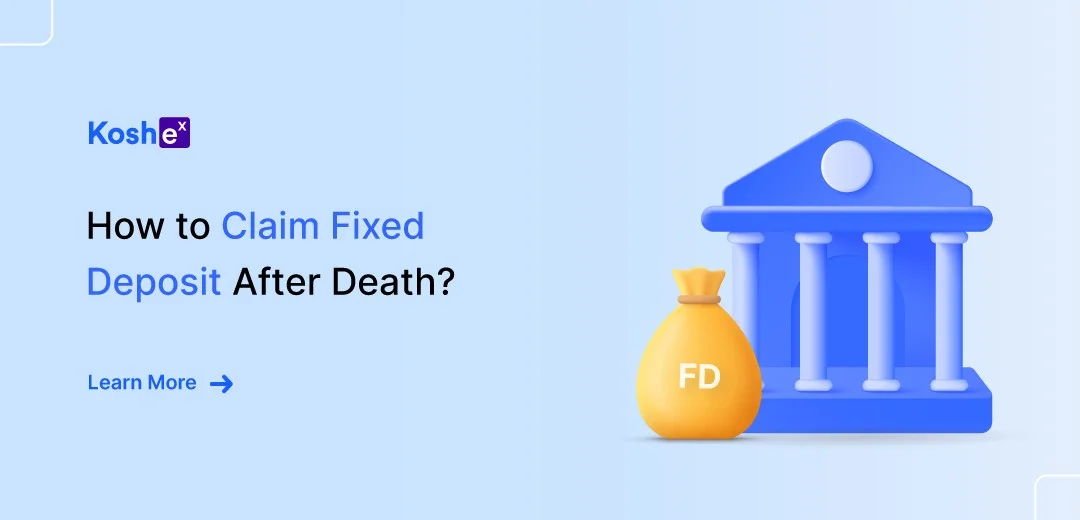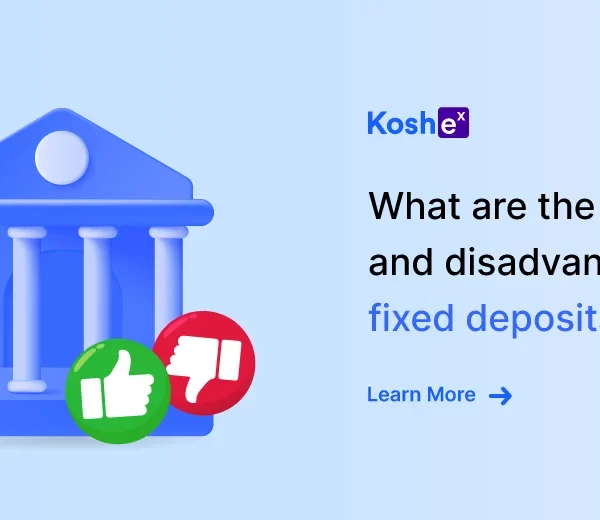Claim Fixed Deposit After Death: Complete Procedure
Fixed deposits (FD) are some of the most secure investing avenues. They have remained investor’s choice for decades, and we often heard about FDs from our parents and grandparents. Further, we can invest in fixed deposits individually and jointly.
Upon maturity, we can either claim fixed deposit or renew it. However, what if a primary holder of the fixed deposit holder dies? How can the money be claimed back in such situations? Sign up with Koshex to explore more secure investing options.
To understand this, we need to understand how the holding pattern works and the nominee’s role in fixed deposits.
Holding Pattern of Fixed Deposit
As stated earlier, fixed deposits can either be held individually or as joint holding. If it is a joint holding, one must decide how the account will be operated. The following are the options available:
- Either or Survivor: Here, only two people can open the fixed deposit account. The banking / financial institution will execute the instructions upon request by either account holder.
- Anyone or Survivor: Here, more than two people can open an FD account here. The instructions will be executed upon request by even one of the account holders.
- Latter or Survivor: Here, only the secondary account holder is allowed to operate the account. The primary account holder can operate after the demise of the secondary account holder.
- Former or Survivor: It is the opposite of the latter or survivor mandate. Here, only the primary account holder is allowed to operate the account. After the primary account holder dies, the secondary account holder can manage the account.
- Joint: The account will be operated only after all the joint account holders give permission.
- Jointly or Survivor: It is similar to the joint mandate above. However, in case of the demise of any of the account holders, the survivors are allowed to continue operating the account.
Who is a Nominee?
We often encounter the requirement to appoint a nominee when it comes to money matters. This is because, when the investor dies, it is important to know who is officially entitled to receive the money left by the deceased investor. This is where the nominee comes into the picture.
A nominee is an individual who will receive the money left by the deceased investor. However, the nominee only acts as a holder.
The wealth is eventually distributed among the legal heirs of the deceased as per the will or the law. Legal heirs are usually the immediate family members of the FD holder.
Claiming Fixed Deposit After Demise of the Account Holder
After the demise of the fixed deposit account holder, the financial institution needs to be intimated about the death. The financial institution will then process the FD as follows:
Individual Account Holder
If the FD only had a single account holder, then the nominee shall submit the death certificate of the deceased FD account holder to the financial institution. The nominee shall also provide proof of his identity. Suppose the FD account does not have any nominee.
In that case, the legal heirs of the deceased account holder can present the death certificate, identity proofs, and succession certificate to claim fixed deposit.
Joint Account Holders
In case the FD is held jointly by more than one person, then the following shall be the process to claim fixed deposit:
- Either or Survivor / Former or Survivor / Latter or Survivor: Here, the survivor account holders can continue the FD account by providing the death certificate of the deceased account holder.
- Jointly or Survivor: Here, the survivor account holders can continue the FD account by furnishing the death certificate of the deceased account holder.
- Anyone or Survivor: Here, the secondary account holder will assume the role of the primary holder till the date of maturity of the fixed deposit. In case there are more than two account holders, all of the account holders must provide the signed consent form for the transition.
Nominee: In the case of joint holding of the fixed deposits, a nominee enters the picture only if all the holders of the FD die. In such a case, the nominee shall be entitled to withdraw the funds. However, if there’s no nominee, the legal heirs can claim fixed deposit by presenting the succession certificate.
Premature Claiming of FD
If the survivors, nominee or legal heirs of the deceased want to claim fixed deposit prematurely, then they will have to follow the below steps:
Individual Account Holder
In the case of an individual FD account, the nominee or the legal heir will have to request the financial institution to close the FD. They will need to produce the necessary documents, such as the death certificate of the deceased investor, identity proofs, and succession certificate (in case of a legal heir). They can close the FD but will lose interest for the remaining term.
Joint Account Holders
In the case of a joint FD account, the survivor(s) or holder can withdraw the FD prematurely only if all the joint account holders have given their permission at the time of opening the FD account.
Further, premature withdrawal shall be permitted only if survivors and legal heirs and survivors agree to the same. All the necessary documents shall be submitted, like the death certificate of the deceased account holder, KYC documents and the succession certificate (in case of a legal heir).
Conclusion
The convenience and simplicity of fixed deposits have encouraged Indians to invest in FDs for decades.
Claiming an FD after the account holder’s death is easy, as financial institutions extend full support while making a claim. However, one thing to remember is that the procedure might differ depending on where the FD account is.
At Koshex, investors can do more with their money and make hassle-free investments such as mutual funds, smart deposits, and digital gold.
Koshex is an investment platform that allows investment in high-return-generating fixed deposits. The process of making the deposit and the withdrawal is quite simple, and investors can expect full support from the backend staff. Sign up with Koshex for free to begin your smart, personalized investment journey.
FAQs
Q: Will a penalty be levied in case of premature withdrawal of the FD after the death of the account holder?
A: This depends upon the policy of the financial institution. Each financial institution has a different policy when it comes to premature withdrawal. While some may cut the interest rates, others may levy additional charges.
Q: Is there any tax exemption available for investing in fixed deposits?
A: Yes. In case of an investment in a 5-year term deposit, one can claim the deduction of the same under Section 80C of the Income Tax Act, 1961. The maximum deduction claim is up to Rs.1.50 lakh each financial year.
Q: Do senior citizens receive the same interest as other deposit holders?
A: Senior citizens receive higher interest than non-senior citizen deposit holders. The interest rate can be 0.5%-1% higher for senior citizen fixed deposits.









Leave a Comment